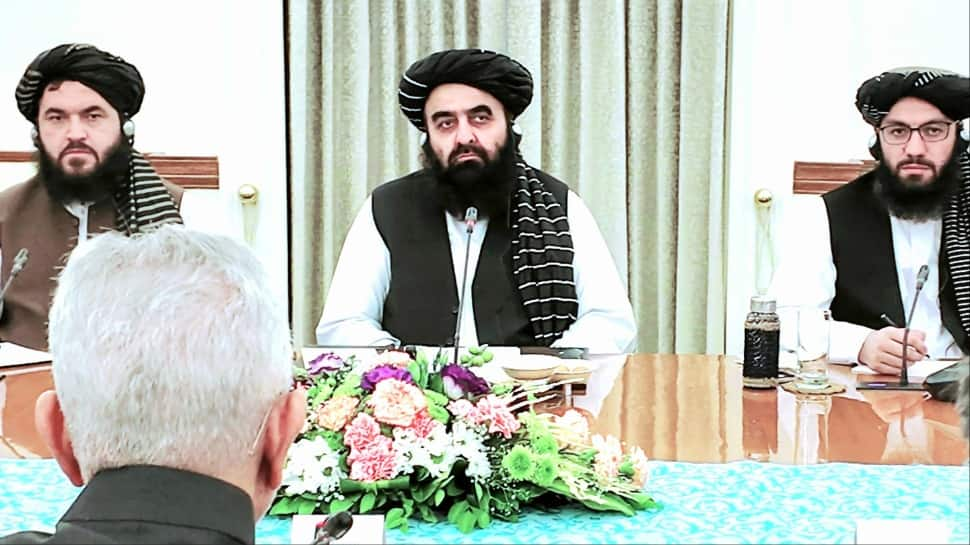Politics
Afghan Foreign Minister Addresses Backlash Over Women Journalists

Afghanistan’s Foreign Minister Amir Khan Muttaqi responded to the backlash over the absence of female journalists at a recent press conference, attributing the situation to a “technical issue.” The controversy erupted following the event held on October 12, 2025, which many perceived as an “insult to women.” In a clarification made during his second press conference, Muttaqi stated that the event was organized on short notice and that a selective list of journalists was invited.
Muttaqi explained, “Regarding the press conference, it was organised on short notice. (There was) a short list of journalists who were invited. It was more of a technical issue, but there was no other problem.” This statement came after significant criticism from opposition leaders and the public, who condemned the lack of representation for women journalists.
The initial press conference had taken place shortly after Muttaqi met with S. Jaishankar, India’s External Affairs Minister. Following the event, Rahul Gandhi, a Congress Member of Parliament, criticized Prime Minister Narendra Modi for permitting the exclusion of female reporters. Gandhi argued that this decision sent a harmful message to women across India, suggesting that the government was “too weak to stand up for them.”
Former Union Minister P. Chidambaram also expressed his dismay on social media, stating that male journalists should have walked out in protest against the exclusion of their female colleagues. Amid the uproar, sources from the Indian Ministry of External Affairs clarified their lack of involvement in the organization of the press conference, noting that invitations were issued by Afghanistan’s Consul General in Mumbai to select journalists in Delhi.
The Afghan minister further discussed issues pertinent to Afghanistan, including education and relations with Pakistan. He reported that approximately 10 million students are currently enrolled in educational institutions across Afghanistan, of which 2.8 million are women and girls. “There are certain limitations in specific parts, but that does not mean that we oppose education,” he stated.
On the topic of Afghanistan’s relationship with Pakistan, Muttaqi expressed a desire for peaceful relations. He remarked, “The people of Pakistan, in the majority, are peace-loving and want good relations with Afghanistan.” He acknowledged that some elements in Pakistan contribute to ongoing tensions but emphasized that Afghanistan remains committed to safeguarding its national interests.
Muttaqi also highlighted the support from international allies, mentioning that both Qatar and Saudi Arabia have encouraged an end to hostilities, indicating that Afghanistan has paused its military response for the time being. “We only want good relations and peace,” he added, reiterating Afghanistan’s resolve to protect its sovereignty.
The Taliban regime has faced extensive criticism from various nations and organizations, including the United Nations, for imposing severe restrictions on women’s rights in Afghanistan. As the situation continues to evolve, the international community remains watchful of developments in the region and the implications for women’s representation in public discourse.
-

 World5 months ago
World5 months agoSBI Announces QIP Floor Price at ₹811.05 Per Share
-

 Lifestyle5 months ago
Lifestyle5 months agoCept Unveils ₹3.1 Crore Urban Mobility Plan for Sustainable Growth
-

 Science4 months ago
Science4 months agoNew Blood Group Discovered in South Indian Woman at Rotary Centre
-

 World5 months ago
World5 months agoTorrential Rains Cause Flash Flooding in New York and New Jersey
-

 Top Stories5 months ago
Top Stories5 months agoKonkani Cultural Organisation to Host Pearl Jubilee in Abu Dhabi
-

 Sports4 months ago
Sports4 months agoBroad Advocates for Bowling Change Ahead of Final Test Against India
-

 Science5 months ago
Science5 months agoNothing Headphone 1 Review: A Bold Contender in Audio Design
-

 Top Stories5 months ago
Top Stories5 months agoAir India Crash Investigation Highlights Boeing Fuel Switch Concerns
-

 Business5 months ago
Business5 months agoIndian Stock Market Rebounds: Sensex and Nifty Rise After Four-Day Decline
-

 Sports4 months ago
Sports4 months agoCristian Totti Retires at 19: Pressure of Fame Takes Toll
-

 Politics5 months ago
Politics5 months agoAbandoned Doberman Finds New Home After Journey to Prague
-

 Top Stories5 months ago
Top Stories5 months agoPatna Bank Manager Abhishek Varun Found Dead in Well









